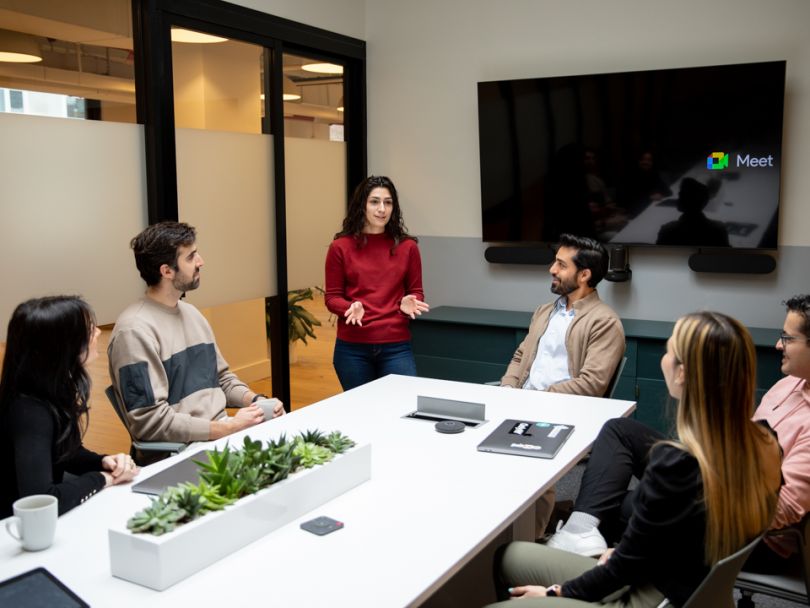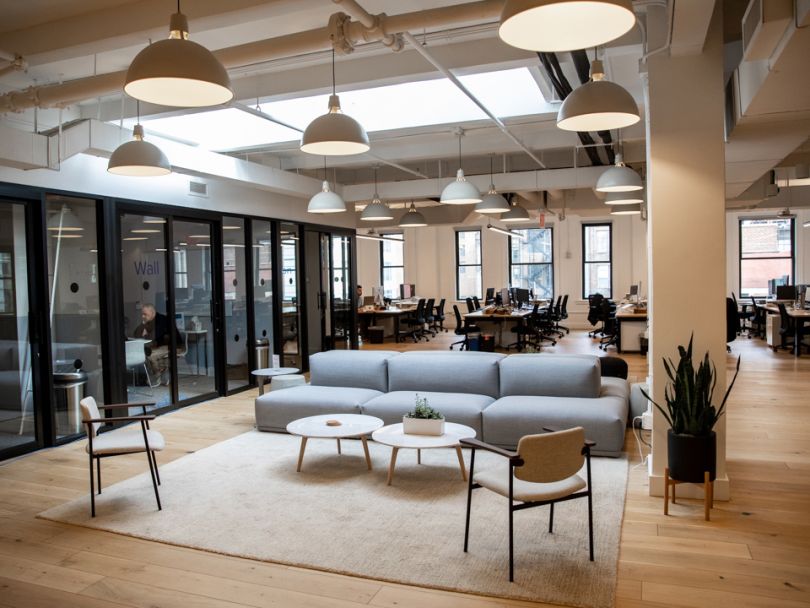The flexibility to live and work wherever she wanted was never a high priority for Jane Gold — until the start of the pandemic.
The Reonomy product analyst was working for a large financial institution in New York City, but after her company made the decision to work from home, Gold did something she never would have predicted: she moved back in with her parents in Buffalo, New York.
Gold lived and worked there for eight months alongside her brother, who had experienced a similar remote work transition. Not only did the experience shift her concept of work flexibility, it also made Gold reevaluate her life priorities.
“Spending that extra time at home with family became much more important to me and a higher priority in my life,” Gold said. “That’s why when I made the decision to look for a new job five months ago, Reonomy’s hybrid work model was crucial. Because I knew I would be spending periods of time at home in Buffalo, and that would be OK.”
Gold was hardly alone in her mindset. The hybrid work model is changing expectations around the future of work, providing people like Gold the flexibility to start every morning with a question: Where am I going to be most productive today?
“At Reonomy, I’'m encouraged to make that decision for myself, and I’m respected for the decision that I make,” Gold said.
In addition to its pivot to hybrid work, Reonomy was recently acquired by Altus Group, a company that has also shifted its work-from-home mindset due to the pandemic. What does this acquisition mean, and what will the future of work look like for Reonomy as an Altus Group business? Built In NYC sat down with two Reonomy employees and one Altus Group team member to find out.
WHAT THEY DO

What is the arc of the work-from-home policy at your respective companies?
Ali Assadi, VP of Business Development at Altus Group: I have a unique perspective, because 11 years ago, I started at Altus Group as a consultant. I was always at the office, knee deep in the models and running financial analyses for customers. At the time, there wasn’t much of a belief that one could be productive at home. But fast forward to today, we now have a hybrid office, and I think the company has adapted well to that change. It undoubtedly serves us by both attracting and retaining top talent.
Alex Roth, Director of Backend Engineering at Reonomy, an Altus Group Business: Pre-pandemic, the culture at Reonomy was that leadership wanted people to work in the office. The key reason was wanting to maintain open collaboration. We had a work-from-home policy, but I and others rarely used it. Ever since the pandemic, we’ve evolved to a hybrid office, where the whole team is distributed across the nation, and working from home is more normalized.
We aren’t forcing people to come into the office; it’s completely voluntary. That has the added benefit of allowing our talent to feel comfortable working wherever they see fit.
What does the hybrid work model look like at Altus and Reonomy?
Assadi: The key word is balance. Depending on their preference, people are working from home two or three times a week, and that’s great. But we’re also promoting a return to the office, which is what our clients, commercial real estate (CRE) owners, are promoting. Because empty office buildings for the foreseeable future is probably not a good thing for global economies. Also, I feel like the hybrid model is a little dependent on your role. There will always be a need for people to collaborate. It’s important for people to have that in-person connection. It’s also important for new hires or people transitioning to new roles to be in front of their peers as they assimilate into the culture and company. It’s all about finding the right balance.
Gold: As a newer hire, I was lucky that Reonomy opened up the office in my second week. I’m a huge believer that the culture of a company is its most stable foundation, and without those connections and common sense of purpose, it's harder to succeed. I took advantage of going into the office as much as I could at the start. Now, I feel more comfortable working from home, because I feel like I have established connections with my colleagues and I have developed my own connection to our mission and values.
Choosing where to work – at home or in the office – is truly an autonomous decision. My manager is supportive of whichever location I choose to work from. Technology and video capabilities are integrated in every meeting regardless of whether or not your team is in the office. It ensures that everyone is on the same playing field. Liking where you work has become more important than ever, and I think the way Reonomy’s culture is cultivated, we are able to retain the pillars of what makes Reonomists, Reonomists, regardless of physical location.

What are the necessary ingredients of a company to succeed in a hybrid work model?
Roth: Trust. I became a leader during the pandemic. It’s difficult to manage people remotely. But at the same time, I trust my direct reports. I treat them like adults. The first time I meet with them I say, “You’re an adult, I trust you to be honest with me. I’ll be honest with you, and I’ll be transparent. And if you can’t live up to that, that’s going to break our trust.” I’ve had direct reports who’ve wanted to do the whole digital nomad lifestyle and travel the country. I always say, “Go for it, just make sure you meet our expectations and you get your work done.”
Assadi: Structure, a robust onboarding and training, and goal-setting are all crucial. Periodic group activities and events that promote collaboration, group think, and happy hours are also important. Above all, the most important ingredient is effort. I read somewhere that the 10,000 hours it takes to master a skill are equivalent to 15,000 hours virtually. That’s because you don’t get to learn through osmosis — rubbing shoulders with your peers and your superiors during meetings, lunches and team gatherings. That means as you venture into the hybrid model, you’ll have to put in more time and effort, especially as a new hire.
Why would someone choose to work at Reonomy/Altus Group as an employee vs. another work-from-home company?
Assadi: Altus is disrupting the CRE industry and introducing innovation to a sector that has historically trailed equity and debt markets. Under new leadership and a series of high-profile acquisitions, we’ve undergone significant transformations in just the past year. This has naturally created unique opportunities for career growth and for lateral moves within the firm. Having the chance to do this under our hybrid work model makes Altus a good choice for any ambitious, smart and goal-seeking individual. Additionally, Altus has a great culture rooted in our values: lead with integrity, work inclusively, think boldly, strive to outperform; and create exceptional experiences.
Roth: On the technical side, we are poised to become a market-leading tech firm. There are a lot of interesting, complex projects inside of Reonomy/Altus right now, whether it’s system design, data engineering, back-end API engineering, front-end engineering, or data science. We are a company built on trust and our leadership is fostering a culture of accountability and ownership over the products engineers develop. There’s big growth potential — both within the industry and for someone’s professional career.

Where are you most productive?
Gold: I like noise. I need background noise to do any type of work. So I prefer to go to the office, especially when I know people are there. I also float around the office. I’ll sit at a desk, and then I’ll go to a couch, and then I’ll go to the kitchen counter, and then I’ll go to a board room. But when I’m in meetings that I know will consist of remote employees, I’d prefer to work from home so I can be present with them.
Roth: I like the office. When I was an engineer at the beginning of the pandemic, working from home was nice, because I was able to have deep focus. But now as a leader, there are a lot more meetings. I also like coming into the office because it gives me a set schedule.
Looking ahead, what does it mean that Reonomy was recently acquired by Altus Group?
Assadi: Reonomy combined with Altus helps our clients be more efficient and more strategic. We’ve doubled-down on AI machine learning. This acquisition gives us that one-stop-shop offer that is unmatched in the industry and puts us in a completely different conversation.
Roth: This acquisition has taken Reonomy into the big leagues. We’re operating at a much bigger scale. When Reonomy started, we were a scrappy startup disrupting the CRE space. With this acquisition, Reonomy’s engineering team and research and development team have been able to scale. We’ve added Reonomy’s machine learning pipelines into Altus’ pipelines. Altus has incredible data. So it’s another thing to add to the Reonomy data pipeline to make the Reonomy data systems better as a whole. Also, it’s just a great mesh of cultures.






